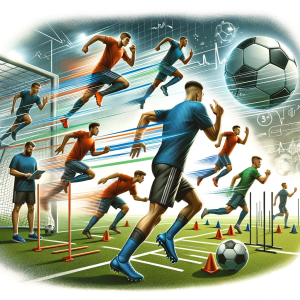
Science and Strategies for the Modern Game
Soccer transcends cultures and continents, uniting people in their love for the sport. Beyond its appeal as a spectator sport, soccer has evolved into a scientific discipline, with researchers continuously exploring ways to enhance performance and reduce injuries. This week’s review delves into the intersection of science and soccer, drawing from the latest research and insights.
The Science of Soccer Training
Advances in sports science have demonstrated significant impacts on soccer players’ training regimens. Researchers have focused on developing evidence-based methods to improve performance and athlete health, with studies highlighting the importance of personalized training approaches. According to Lasell University’s soccer science program, integrating sports science into soccer coaching can enhance player assessment and team training.
Cutting-Edge Research in Soccer
Recent findings published in Science and Medicine in Football indicate the importance of understanding biomechanics in improving players’ kicking techniques. For instance, a player’s performance dynamics are significantly influenced by their skill in executing the “instep soccer kick,” where biomechanics play a crucial role in optimizing energy transfer and accuracy.
Preventing Injuries Through Science
Injuries, particularly head injuries, pose substantial risks in soccer, necessitating robust scientific inquiry. The British Journal of Sports Medicine highlights ongoing research in understanding and preventing sport-related concussions. With concussions being a focal point of concern, strategic interventions in training and equipment design continue to be critical areas of study.
Technology and Performance Analysis
As soccer embraces technology, analyzing match data has become imperative. Advanced metrics now track player movements, providing invaluable insights into physiological demands and tactical efficiencies. A comprehensive study showcased in the International Research in Science and Soccer II explores various aspects such as match analysis, training, testing, and youth development, emphasizing the multifaceted approach required to excel at different levels of play.
Nutrition and Recovery
Beyond physical training, nutrition and recovery are integral to a player’s performance. Modern soccer incorporates nutritional strategies that focus on optimizing energy levels and enhancing recovery. Innovative approaches in nutrition science are being integrated into team diets to help players maintain peak performance throughout the season.
Women in Soccer
Women’s soccer has gained significant traction, and its development relies heavily on scientific research. Studies within the Journal of Sports Science and Medicine underline the physiological differences and specific training needs of female players, paving the way for more tailored and effective training protocols.
Conclusion
The evolution of soccer from a recreational pastime to a data-driven, scientifically-backed discipline illustrates its dynamism and potential for further innovation. As researchers and practitioners continue to merge insights from various scientific domains, the future of soccer promises not only enhanced performance but also an increased emphasis on player safety and well-being.



